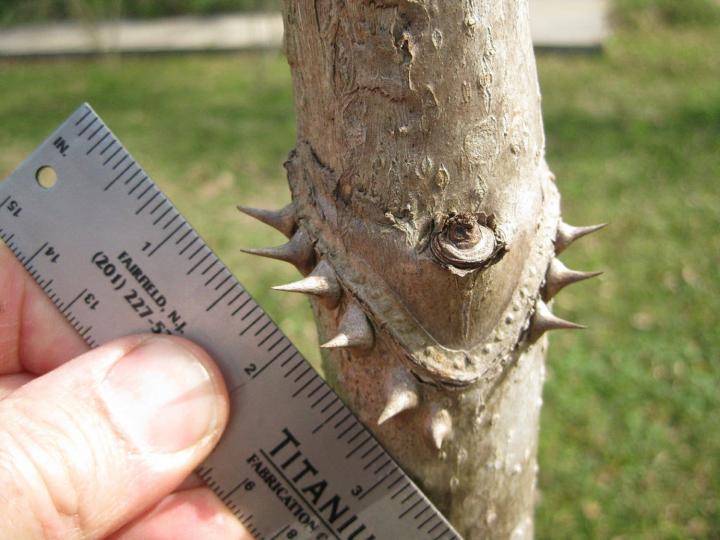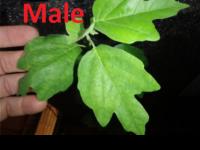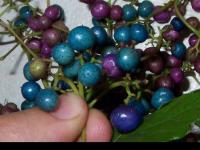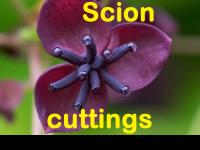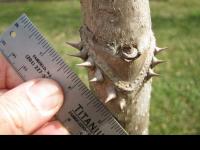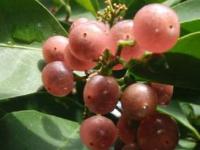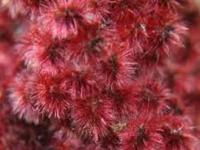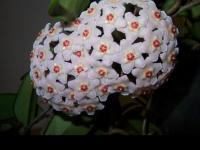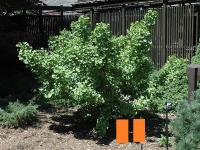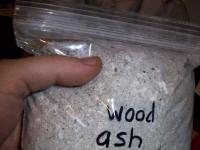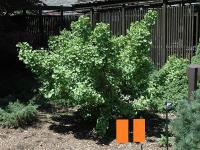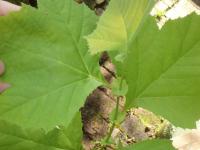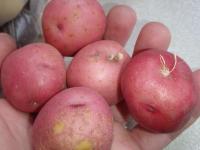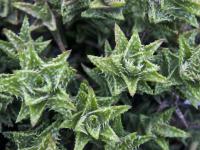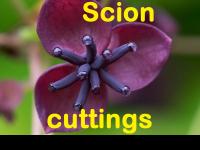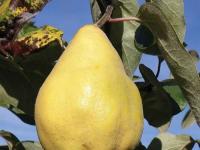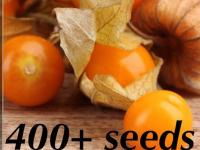Up for sale 200 seeds of Aralia spinosa American Angelica Tree DEVIL'S WALKINGSTICK
Seeds are in dried berries
Seeds will be sent in ziplock bag with bubble wrap padding in envelope.
Aralia spinosa, commonly called devilâs walking stick or Hercules club, gets its common name from the stout, sharp spines found on its leaf stalks, stems and branches. This is a large, upright, suckering, deciduous shrub that typically grows to 3-4.5 m tall, but infrequently grows as a small flat topped tree to as much as 10 m tall. It is native to Missouri where it typically occurs in low upland woods, thickets, wooded slopes, bluffs and ravines in several counties in the far southeastern corner of the state (Steyermark). In other parts of its native range in the eastern U.S., it is commonly found in wood margins, fields and pastures. Interesting compound foliage, late summer flowers, juicy black fruit and spiny stems give this shrub distinctive and unique ornamental interest. Sparse, upright, mostly unbranched, club-like branches, ringed with conspicuous leaf scars and spines, are typically naked at the bottom but crowned at the top by umbrella-like canopies of huge compound leaves. Alternate, bipinnate to tripinnate, medium to dark green leaves grow 60-150 cm long and 60-120 cm wide, with individual leaflets (5-10 cm long) having toothed margins. Foliage turns pale yellow to dull purple brown in fall. Small, 5-petaled, white flowers (to 3 mm across) bloom in huge, terminal, umbellose panicles (to 60 cm long) in JulyâAugust. Flowers are quite showy and very attractive to bees. Flowers are followed by clusters of fleshy, spherical, black drupes that ripen in late August-October. Drupes are quite attractive to birds.
Cultivation: Hardy to zone 5. Easily grown in average, medium moisture, well-drained soils in full sun to part shade. Prefers moist, fertile, humusy loams, but tolerates a wide range of soils including rocky and clayey ones. Tolerates drought. Generally tolerates many urban pollutants. Best sited in areas sheltered from strong winds to help protect the large compound leaves.
Use: Beautiful ornamental shrub or small tree. Best utilized in infrequently traveled areas where contact with the plant spines is unlikely. Plants can appear coarse in winter, but the compound foliage, flowers, fruit and general plant habit lend diversity and interest during the growing season. Good for shrub borders, woodland margins and remote areas of the landscape where it can be allowed to spread.
Medical use: The bark, especially of the roots is the part most commonly used medicinally, though other parts of the plant, including the fruit.
ornamental value (leaves, fruit, flowers)
resistant to disease and pests
bee and bird plant
creates a deep shade where wanted
easy to transplant (even in the summer), roots not aggressive
low maintenance
PayPal payment must be received within 3 days after the auction ends, then I ship the item. Feel free to ask me any questions about this item. I am always glad to help you.
International shipping soil less upon request, in vermiculite or wet sphagnum moss bare root , otherwise - in soil. Well packed for long travel. Check your local laws for enter plants. Not responsible for confiscated items. Can not send to CA. But if you want we can ship it to your relatives in other states (provide the address by mail after the purchase) as a present. Aralia spinosa 200 seeds/berries, American Angelica - DEVIL'S WALKINGSTICK Rare Exotic Hardy Tags: rare,plant,seeds,WALKINGSTICK,DEVIL'S,Tree,Angelica,American,Aralia,spinosa
Seeds are in dried berries
Seeds will be sent in ziplock bag with bubble wrap padding in envelope.
Aralia spinosa, commonly called devilâs walking stick or Hercules club, gets its common name from the stout, sharp spines found on its leaf stalks, stems and branches. This is a large, upright, suckering, deciduous shrub that typically grows to 3-4.5 m tall, but infrequently grows as a small flat topped tree to as much as 10 m tall. It is native to Missouri where it typically occurs in low upland woods, thickets, wooded slopes, bluffs and ravines in several counties in the far southeastern corner of the state (Steyermark). In other parts of its native range in the eastern U.S., it is commonly found in wood margins, fields and pastures. Interesting compound foliage, late summer flowers, juicy black fruit and spiny stems give this shrub distinctive and unique ornamental interest. Sparse, upright, mostly unbranched, club-like branches, ringed with conspicuous leaf scars and spines, are typically naked at the bottom but crowned at the top by umbrella-like canopies of huge compound leaves. Alternate, bipinnate to tripinnate, medium to dark green leaves grow 60-150 cm long and 60-120 cm wide, with individual leaflets (5-10 cm long) having toothed margins. Foliage turns pale yellow to dull purple brown in fall. Small, 5-petaled, white flowers (to 3 mm across) bloom in huge, terminal, umbellose panicles (to 60 cm long) in JulyâAugust. Flowers are quite showy and very attractive to bees. Flowers are followed by clusters of fleshy, spherical, black drupes that ripen in late August-October. Drupes are quite attractive to birds.
Cultivation: Hardy to zone 5. Easily grown in average, medium moisture, well-drained soils in full sun to part shade. Prefers moist, fertile, humusy loams, but tolerates a wide range of soils including rocky and clayey ones. Tolerates drought. Generally tolerates many urban pollutants. Best sited in areas sheltered from strong winds to help protect the large compound leaves.
Use: Beautiful ornamental shrub or small tree. Best utilized in infrequently traveled areas where contact with the plant spines is unlikely. Plants can appear coarse in winter, but the compound foliage, flowers, fruit and general plant habit lend diversity and interest during the growing season. Good for shrub borders, woodland margins and remote areas of the landscape where it can be allowed to spread.
Medical use: The bark, especially of the roots is the part most commonly used medicinally, though other parts of the plant, including the fruit.
ornamental value (leaves, fruit, flowers)
resistant to disease and pests
bee and bird plant
creates a deep shade where wanted
easy to transplant (even in the summer), roots not aggressive
low maintenance
PayPal payment must be received within 3 days after the auction ends, then I ship the item. Feel free to ask me any questions about this item. I am always glad to help you.
International shipping soil less upon request, in vermiculite or wet sphagnum moss bare root , otherwise - in soil. Well packed for long travel. Check your local laws for enter plants. Not responsible for confiscated items. Can not send to CA. But if you want we can ship it to your relatives in other states (provide the address by mail after the purchase) as a present. Aralia spinosa 200 seeds/berries, American Angelica - DEVIL'S WALKINGSTICK Rare Exotic Hardy Tags: rare,plant,seeds,WALKINGSTICK,DEVIL'S,Tree,Angelica,American,Aralia,spinosa
00975
Payment Methods




Shipping
USPS, $8.60
Payment Policy
We do accept PayPal, personal checks, cash, money orders, Western Union and money-gram.
Shipping Policy
Shipping items right after received payment within 3-5 days.
Plants will be packed securely in the box, preventing it from shifting inside the box, with adequate moisture in the soil or around the roots in case of bare rooted plants during the dormancy.
Return/Exchange Policy
We guarantee plants and/or plant material will arrive alive and safe. If there is a damage to the plant during the shipping please contact us very same day of delivery with the pictures showing the damage so we can see it. We will do everything possible to correct it.
Please Login or Register first before asking a question.
